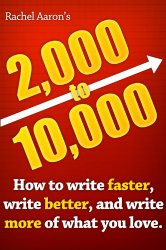Review: 2K to 10K – Writing Faster, Writing Better, and Writing More of What You Love by Rachel Aaron.
You’re not writing as much per day as you would like. The ideas are swimming around in your head, waiting to be put on paper and be done with. At times it actually hurts in there, they’re buzzing around straining to get out. There are so many of them in there that at times you procrastinate because of the sheer volume and the daunting task of getting it all out. I know you do, because I do too. This book promised to solve all that.
Lesson for the day: Titles matter, even if they promise the outrageous. Apply in your own titles.
This was one of those books the title of which jumped out at me. I was, at the time of purchase, convinced that a 2000 words written day was a good day. 10 000 words per day would mean unparalleled progress for my writing business. Hell, I was thinking that my e-books need to be in the 20k range to provide value, and that would mean writing an e-book every two days! I bought the book on that promise alone.
Well planned and written
Aaron starts her book with a nice hyperlinked index, which I now consider industry standard. There was a chapter heading that stood out for me, so I plowed straight into it, attempting to see what that chapter was all about when I grinded through to it.
Easy reading
Aaron’s writing is smooth and intimate, as if you’re having a chat with her over the topic, which makes for easy reading. She then lays out a disclaimer, in which she sets forth her intentions with the book, and mentioned the most important factor that writers need to take into account when reading books like this:
“…While the systems I’ve laid out in part two of this book work amazingly for me, you are not me. You are your own writer, which means only you can understand how to best tell your stories.”
The value of this book
Too often, writers, myself included in the past, have taken advice from books or guru’s as gospel, to our detriment. This does not mean that these books aren’t of value, in fact, it’s integral to your development as a writer. How can you know what works and does not work if you do not have a complete toolbox of options to try out and see? By approaching any teaching on the business with an eye of exploration of options for growth and development, but with the freedom to reject out of hand things that have been proven not to work for you, value can be gained from any source material, even if you do not agree with the content.
Aaron mentioned at the start that she is a plotter, so I felt immediately that this book is a fit for me. The tools can be adjusted to suit pantsers, with a bit of creativity, I’m sure. Like she said: “There is no One True Way in writing.” That said…
If it feels like pulling teeth, you’re doing it wrong
In the meat of the book, Aaron outlines how she accomplished going from (my average) 2k words to (her average) 10k words. Her conversional tone is maintained throughout and the book’s content is quite logically ordered and tempered with her real world experience. Her suggestions are useful and implementable. Personally I am using some of her techniques in order to improve my own writing speed. That was all nice and well until she got to the message of the book.
A prolific writer’s secret revealed
This message is worth the price of admission alone. It’s not a secret, it’s a paradigm shift: Trust your writer’s instincts. A writer has, hopefully, read more books than they would comfortably admit to. That experience has created an instinct for fiction in the writer. If that instinct is unengaged, the process of fiction creation feels like a battle to win instead of the joy of exploration.
Aaron explores this topic with such conviction that she convinced me to re-look at why my old projects stalled, and her steps for investigating the sources of such a lack of fun was more than helpful. It saved me a huge amount of time by convincing me that something was wrong with one of my stories, which prompted an investigation and led to an easy fixed that made the story a great deal better.
Part two: Nuts and bolts.
Aaron uses her personal experience to illustrate how she goes about plotting out her novels. That part is pretty standard. Then she goes off on a tangent with “Characters who write their own stories” and the action picks up once again. This is an important lesson in storytelling, which helped me to overcome some knotty not-fun story problems in my current work. She has a way to make the content enjoyable and informative, using images that stick with you when looking at your own work, which I appreciate.
Writing 10 000 words per day is within your reach.
Aaron never strays far from the primary concern of the book, writing fast, and writing well. She more than delivers on the promise offered by the title, the value goes well beyond the cost of the book. There are unintentional benefits for me in following her methodology, such as her pre-scene writing technique makes it easy to get right back into the bones of the scene, even if you were interrupted in the middle of writing it.
I would heartily recommend this book to anyone interested in speeding up their creative process.
